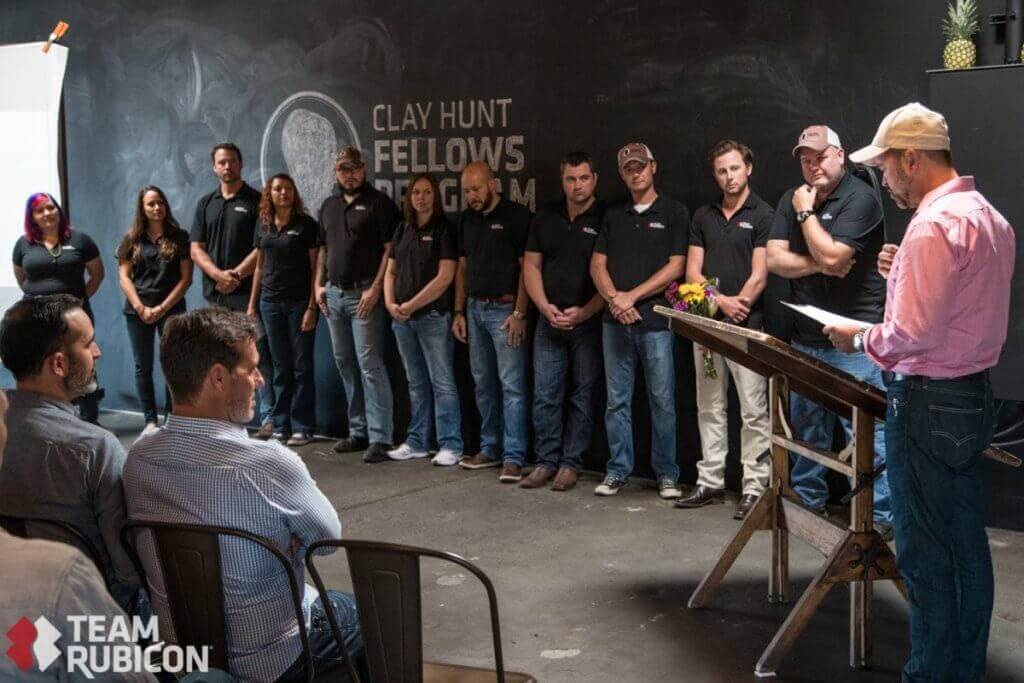
The Clay Hunt Fellows Program (CHFP) was created in 2012 to increase volunteer engagement and to build leadership within Team Rubicon’s domestic disaster response initiatives. The program was inspired by Marine veteran and original TR member Clay Hunt (1982-2011), who embodied service, commitment, sacrifice, and loyalty.
There is no fluff or time wasted in the 12 months the Fellows serve with Team Rubicon. In the first 6 months, the CHFP helps veterans identify how to self-evaluate and dig deep within themselves to unravel the root of any struggles they may be experiencing. Outlooks, relationships, and life trajectories are changed. The program also encourages veterans to reflect on where they came from, who they are, and who they want to be.
In the latter half of the program, Fellows enhance their leadership skills, strengthen their professional capabilities, and build up their individual competency in the field of emergency management. From there, they unite their passions and work with Team Rubicon staff to create a capstone project that will bolster the nonprofit’s effectiveness as a disaster response organization.
Cohort 4 of the Clay Hunt Fellows completed nine capstone projects and presented to staff, supporters, and volunteers at their graduation in June of 2017. These projects were centered around self-awareness, field operations, and leadership training.
Victoria Young, U.S. Navy. Project: Effective Communication Training.
Victoria developed a curriculum to help volunteer members overcome breakdowns in communication during disaster response operations in addition to providing best practices to facilitate effective communication.

David Peterson, Australian Army, and Holly Hellenschmidt, U.S. Air Force. Project Iris.
Project Iris showcased the needs and solutions to ensure effective technical communication in disaster environments. Dave and Holly highlighted scenarios where connectivity in austere environments is challenged and how to possibly overcome the many barriers to communicating when natural disasters impact the flow of information.
 Siggie St. Clair, U.S. Army. Project: Emotional Intelligence Training.
Siggie St. Clair, U.S. Army. Project: Emotional Intelligence Training.
Siggie’s project encouraged volunteer disaster responders to develop their emotional intelligence through in-person interactive training. She identified the benefits of increasing one’s ability to empathize with those impacted by disasters as well as other members of Team Rubicon.
 J.J. Selvig, U.S. Marine Corps. Project: YouSchool and Strengths Finder.
J.J. Selvig, U.S. Marine Corps. Project: YouSchool and Strengths Finder.
JJ unveiled and facilitated YouSchool and Strengths Finder sessions among staff and volunteers to encourage self-awareness training opportunities so teams could identify strengths among the group and foster them to create a higher quality experience and effective team work in the field and in life.
 Chris Scroggins, U.S. Marine Corps and Lisa Smith, U.S. Air Force. Project: The Greyshirt Manual.
Chris Scroggins, U.S. Marine Corps and Lisa Smith, U.S. Air Force. Project: The Greyshirt Manual.
This team created a comprehensive manual to guide newly appointed Team Rubicon leaders to build trust and transparency across the organization as well as share the expectations of those who sign up to lead within the organization.
 Brandon Bunch, U.S. Marine Corps. Project: Field Leader Course.
Brandon Bunch, U.S. Marine Corps. Project: Field Leader Course.
This curriculum was created to provide field leaders with more personalized pre-deployment instruction. Brandon catered content towards new field leaders by outlining what to expect at any given deployment and how to be an effective leader on an operation.

Miguel Hernandez, U.S. Marine Corps. Project: Conflict Resolution Training.
Miguel’s conflict resolution training was designed to empower volunteers to better understand conflict and their role as a leader in working toward solutions.
 Nick Mrzlak, U.S. Navy. Project: Standardized Leadership Training.
Nick Mrzlak, U.S. Navy. Project: Standardized Leadership Training.
Nick, who was hired as TR’s full-time Incident Management Team Chief in late 2016, used his position and years of experience to standardize leadership training across the country. He proposed continued standardization across regions of policy development and management using results that other leadership focused projects from Cohort 4 produced.
 Adam Hale, U.S. Navy. Project Engage.
Adam Hale, U.S. Navy. Project Engage.
Adam measured Team Rubicon’s ability to instill a sense of camaraderie in volunteers across the country. He spoke with 1,500 volunteers during his capstone work and then proposed local projects that would engage volunteers that were otherwise unable to deploy as a result of scheduling conflicts, medical conditions, or family constraints.
The Clay Hunt Fellows Program is unlike any other. With the continuous support of the Bob Woodruff Foundation and the May & Stanley Smith Charitable Trust, this program invests in veterans who are in the process of healing and striving towards growth. Thank you, Cohort 4, for serving in the spirit of Clay.
Cohort 5 began their 12 month fellowship this July.




